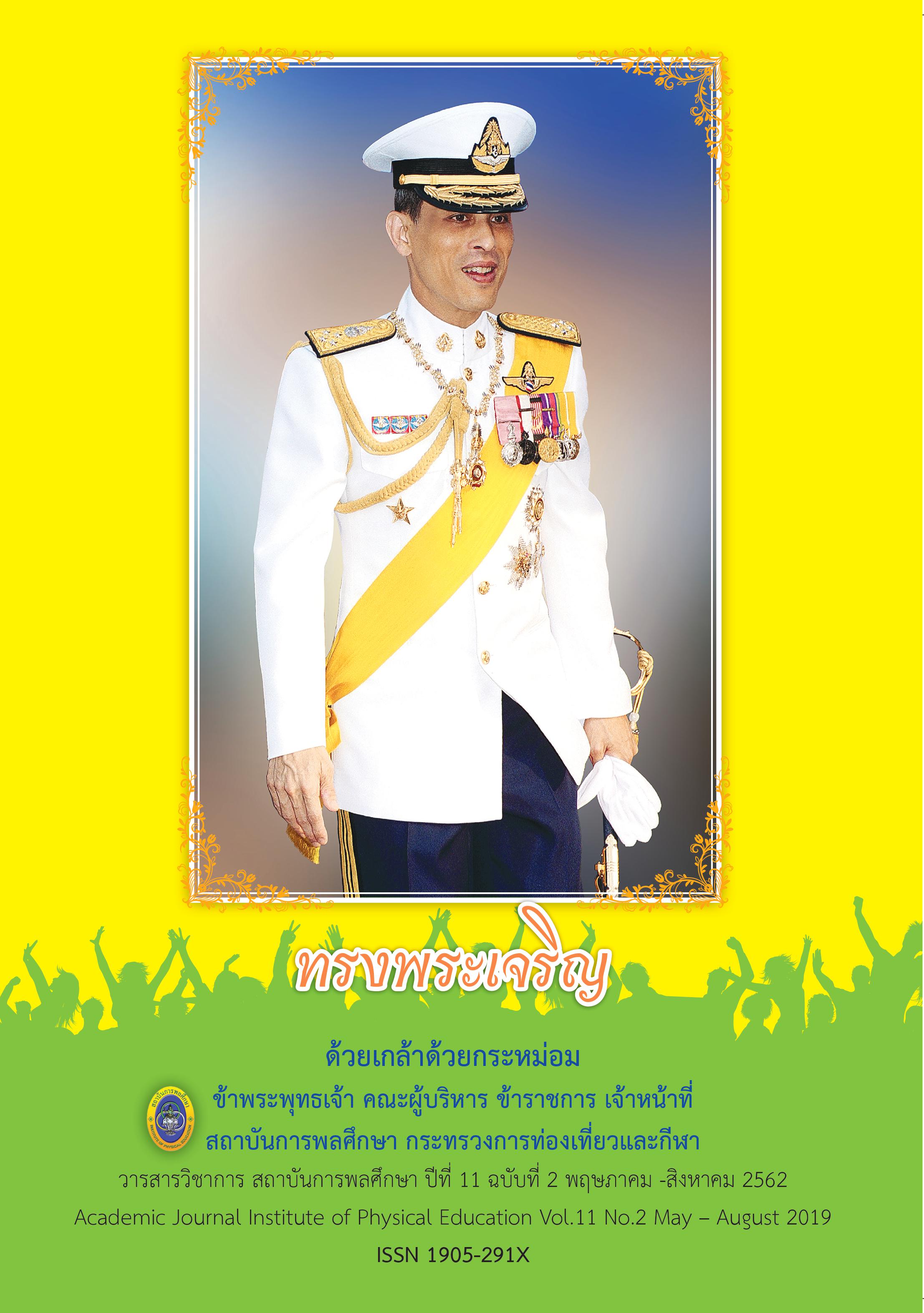DEVELOPMENT OF A TRAINING CURRICULUM FOR RUGBY FOOTBALL TEACHER COACHES IN SECONDARY SCHOOLS
Main Article Content
Abstract
The aims of this study were to develop and evaluate the effectiveness of a training
curriculum of rugby football teacher coaches in secondary schools. A training curriculum was
provided by the reviews of literatures and in-depth interview with rugby football-experts. Focus
group interview with six experts was conducted to analyze the Index of Item Objective
Congruence of training curriculum. The effectiveness of three day-training curriculum
was assessed by the mean scores of 23 purposively selected teachers from three domains;
knowledge, attitude and practice at pre-course, post-course and follow-up assessment.
Mean scores were analyzed by Multivariate Analysis of Variance: MANOVA measure at the
statistical significance level of .05.
The result showed that the main topics of training curriculum of rugby football teacher
coaches were 1) Rules of the rugby football, 2) basic skills of the rugby football, 3) nutrition
of the rugby football, 4) training course of the rugby football, 5) physical fitness improvement
for the rugby football, 6) first aid and injury prevention of the rugby football, 7) analyze and
evaluation on physical fitness of the rugby football, 8) the principle of periodization of the
rugby football.
The mean scores of knowledge, attitude and practice at post-course and follow-up
were significantly higher than pre-course assessment at the levels of .05. The significant higher
score of practice at follow-up were found higher than that of post-course assessment.
The research finding supported the high effectiveness of training curriculum of rugby football
teacher coaches in knowledge, affective and practice development.
Article Details
The published article is a copyright of the Academic Journal of Thailand National Sports University. The passage appeared in each article in this academic journal is a perspective of each author which is not related to the journal. Each author is required to be responsible for all components of his/her own article. If there are any mistakes, each author must be responsible for those mistakes on his/her own.
References
Bearchamp,George A. (1981). Curriculum Theory. Ed 3rd. Illinois. The Kagg.
Boonniphat, P. (1988). Attitude. Bangkok: Thai Wattana Panich. [in Thai].
Chantavanich, S. (2010). Social Theory. Bangkok: Chulalongkorn University. [in Thai].
Conley, M. S., & Rozenek, R. (2001). Health Aspects of Resistance Exercise and Training. Journal of strength and Conditioning Research, 23(6).
Department of Physical Education. (2009). Trainer training course. Bangkok: Department of Physical Education. [in Thai].
Department of Physical Education. Academic Journal of Faculty of Sports Science, Chulalongkorn University. 14(3) 1-12 (September–December 2013) [in Thai].
Gianotti, S. M., Quarrie, K. L., & Humec, P. A. (2009). Evaluation of RugbySmart A rugby union community injury prevention programme. J Sci Med Sport. 12: 371-375.
Goldstein, I. L., & Ford, J. K. (2002). Training in organizations: Needs assessment, development, and evaluation (4th ed.). Belmont, CA: Wadsworth.
Hendricks, S. & Sarembock, M. (2013). Attitudes and behaviours of top-level junior rugby union coaches towards the coaching of proper contact technique in the tackle a pilot study. SAJSM 25: 8-11.
Jampra, P. (2013). A Development of Professional Standards of Football Coaches for Department of Physical Education. Academic Journal of Faculty of Sport Science, Chulalongkorn University. 14(...) 1-2 (September-December 2013)
Kearney, P. E. & See, J. (2017). Misunderstandings of concussion within a youth rugby population. J Sci Med Sport 20: 981-985.
kelman, H. C. (1967). Compliance Attitude Theory and Measurement. New York; John Wilry and Sons Inc.
Krech, D., & Richard S., (1948). Theory and problem of Social Phychology. London: McGraw-Hill.
Mashiko, T., Umeda, T., Nakaji, S., & Sugawara, K. (2004). Effects of exercise on the physical condition of college rugby players during summer training camp. Br J Sports Med. 38: 186–190.
McArdle, D., Katch, F. I., & Katch, V. L. (1996). Exercise physiology. Baltimore: William & Wikins.
Nadler, L., & Nadler, Z. (1989). Developing human resources. San Francisco: Jossey-Bass.
Phutchan, P (2004). Testing and evaluation in physical education. Bangkok: O S Printing House. [in Thai].
Pilantha O Vat, A. (2009). Persuasive communication. Bangkok: Chulalongkorn University. [in Thai].
Pienchob, V. (2018). Including articles on philosophy, principles, teaching methods and evaluation of physical evaluation. Bangkok: Chulalongkorn University. [in Thai].
Prevention and use of related methods in professional basketball: A survey. US National Library of Medicine Jul. 32 : 133-139.
Rankin, C. (1993). Sport and leisure. London: Bowker Saur.
Samitthikrai, C. (2015). Training personnel in the organization. Bangkok: Chulalongkorn University. [in Thai].
Sapwarobol, S. Adisakwatana, S. & Ngamukote, S. (2011). Nutrints for enhancing performance ability. Journal of Sports Science and Health, 12(1), 7–14. [in Thai].
Saylor, G. J., & Alexander, W. M. (1974). Planing Curriculum for Schools. New York: Holt Rinchart and Winston.
Saylor, J. G., Alexander, W. M., & Lewis, A. J. (1981). Curriculum Planing for The Better Teaching and Learning. New York: Holt Rinehart and Winston.
Srichatphimuk, S.(1990). Organization planning and human resource planning. Nonthaburi: Sukhothai Tammathirat. Nonthaburi: Sukhothai Thammathirat Open University Printing Factory. [in Thai].
Sullivan, L. & Molcho, M. (2018). What do coaches want to know about sports–related concussion: A needs assessment study. J Sport Health Sci. 7: 102108.
Taba, H. (1962). Curriculum Development: Theory and Practice. New York: Hartcourt Brance and World.
Tyler, R. W. (1949). Basic Principles of Curriculum and Instruction. Chicago: The University of Chicago Press.
Tyler, R. W. (1957). Basic Principles of Curriculum and Instruction. Chicago: University of Chicago Press.
Wexley, K. N. & Latham, G. P. (1991). Developing and Training Human Resources in Organizations. Harper Collins.
Wilke, J., Niederer, D., Vogt, L., & Banzer, W. (2018). Head coaches’ attitudes towards injury prevention and use of related method in professional basketball: A survey. US National. Library of Medicine Jul. : 133-139.


